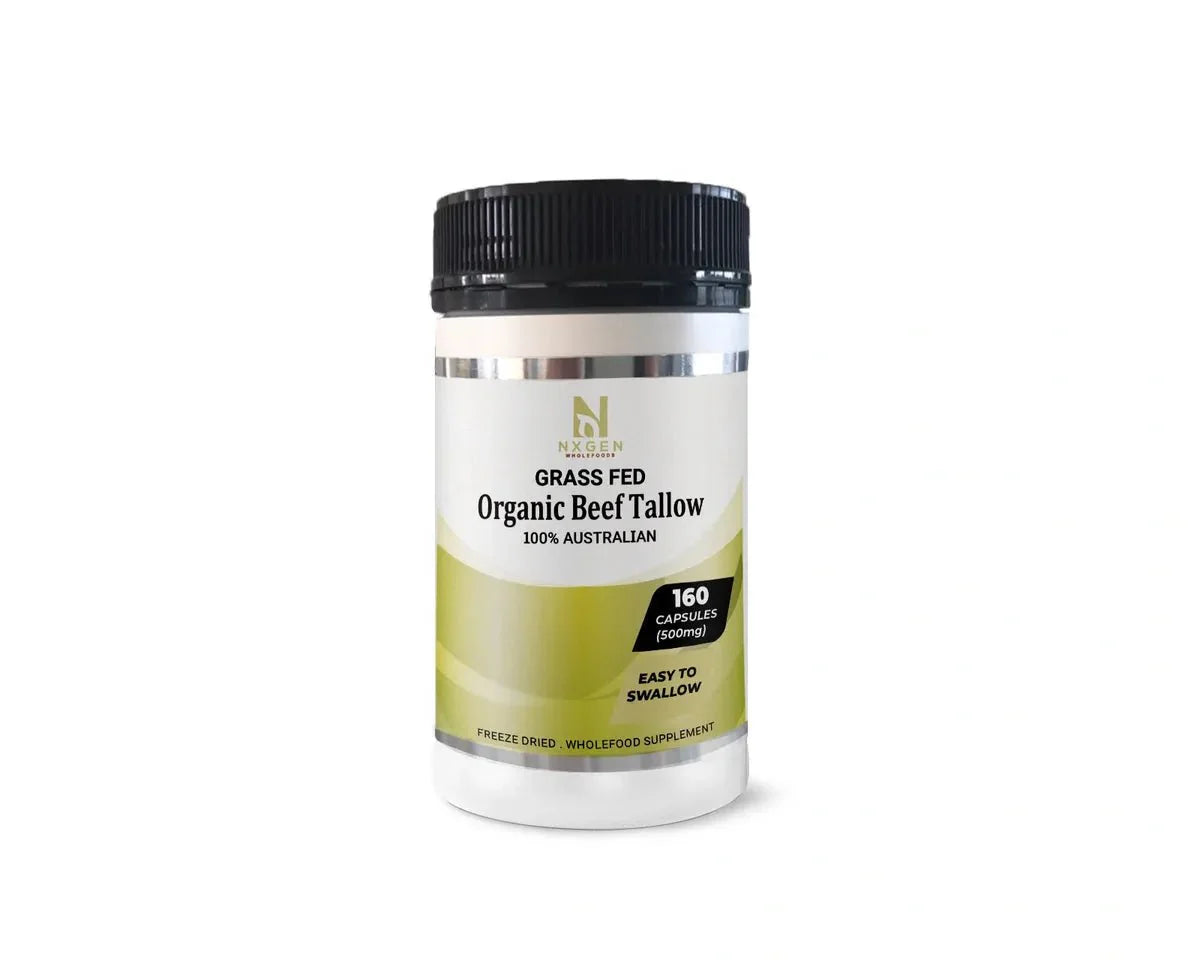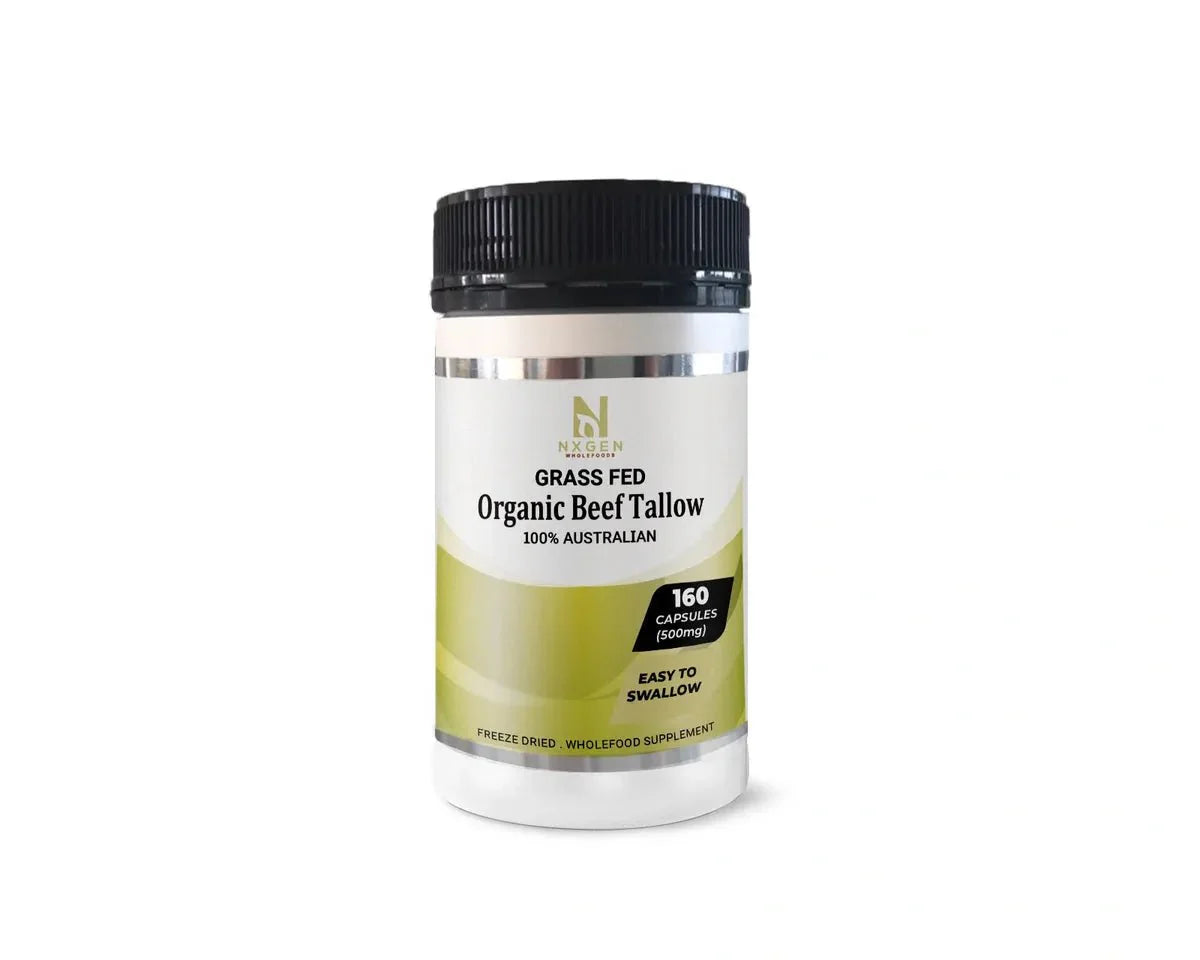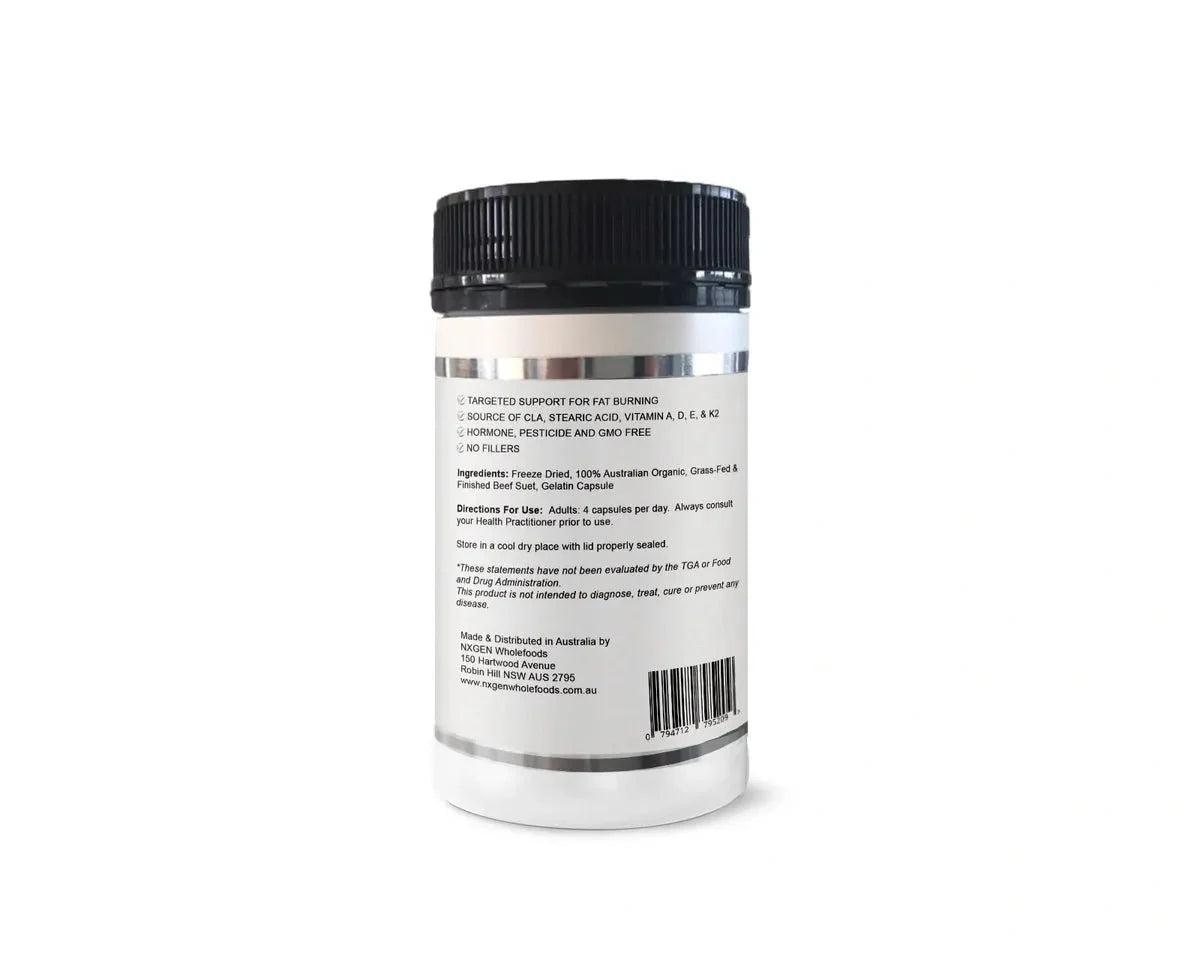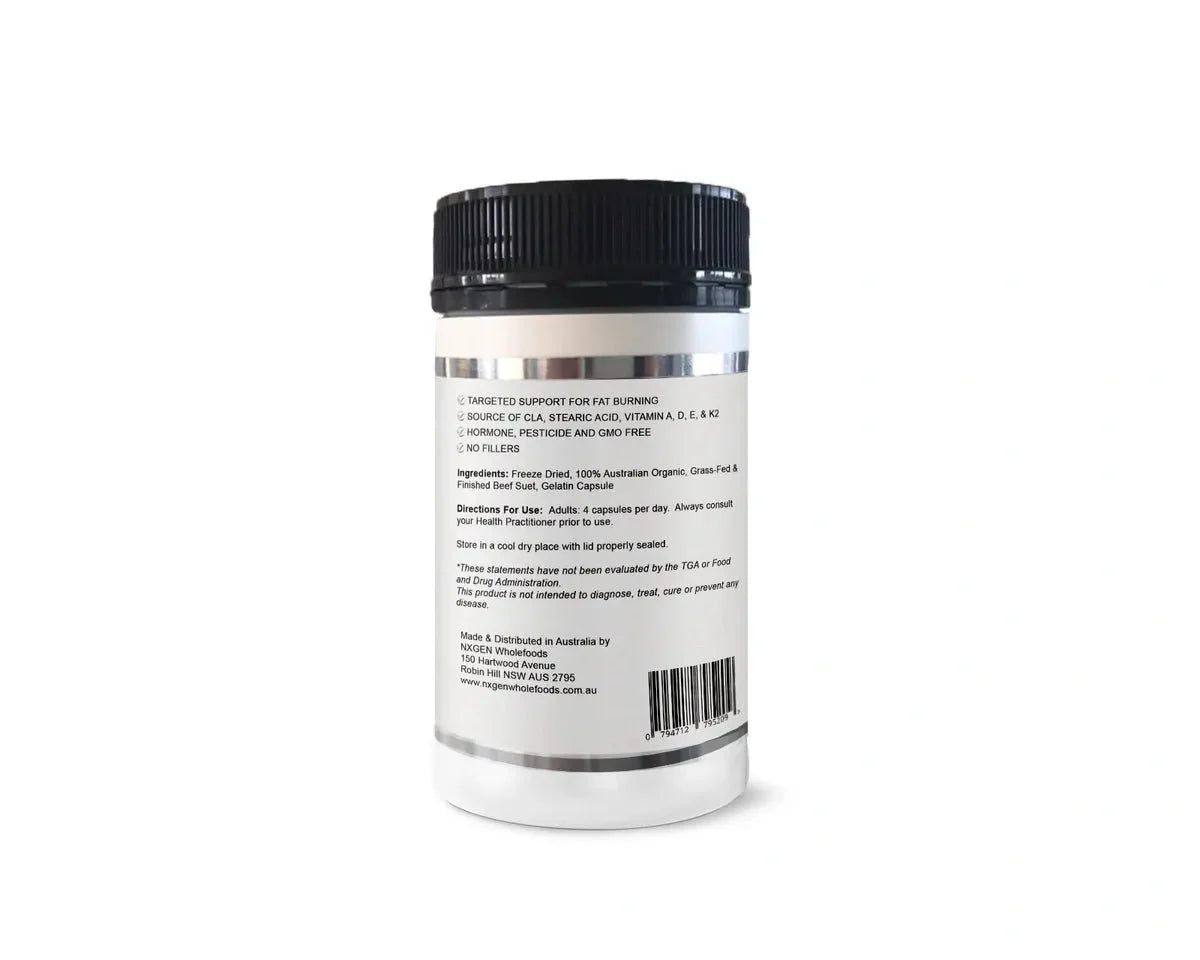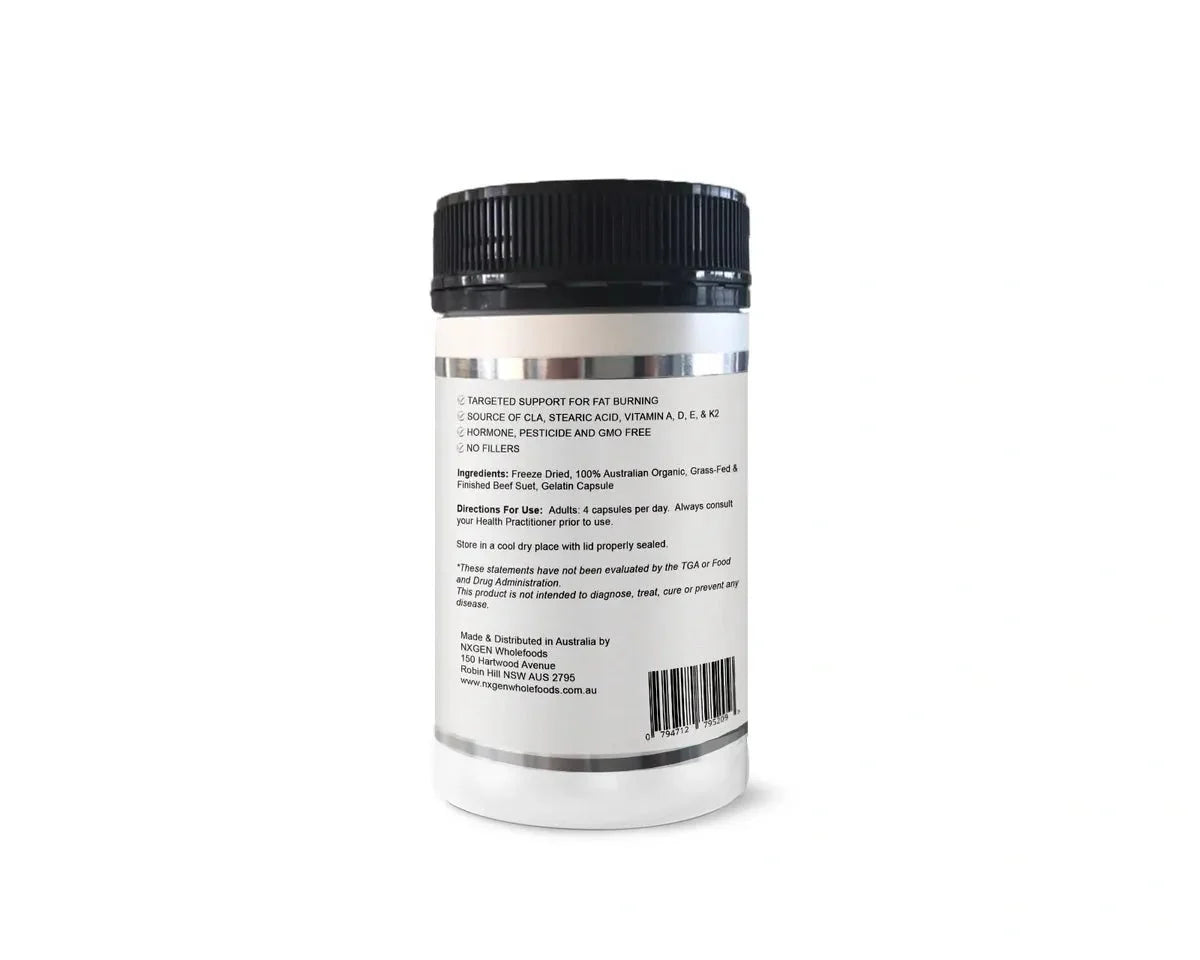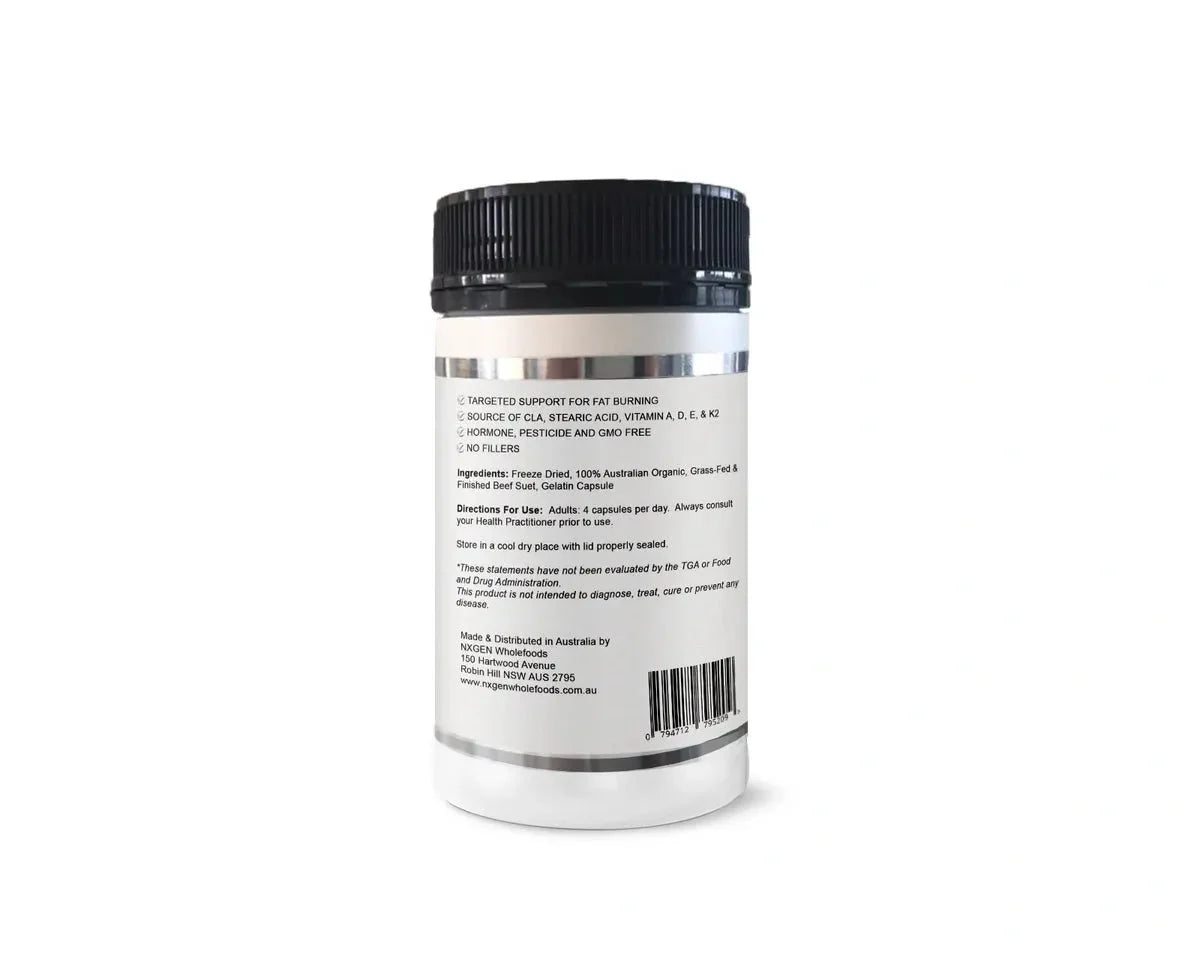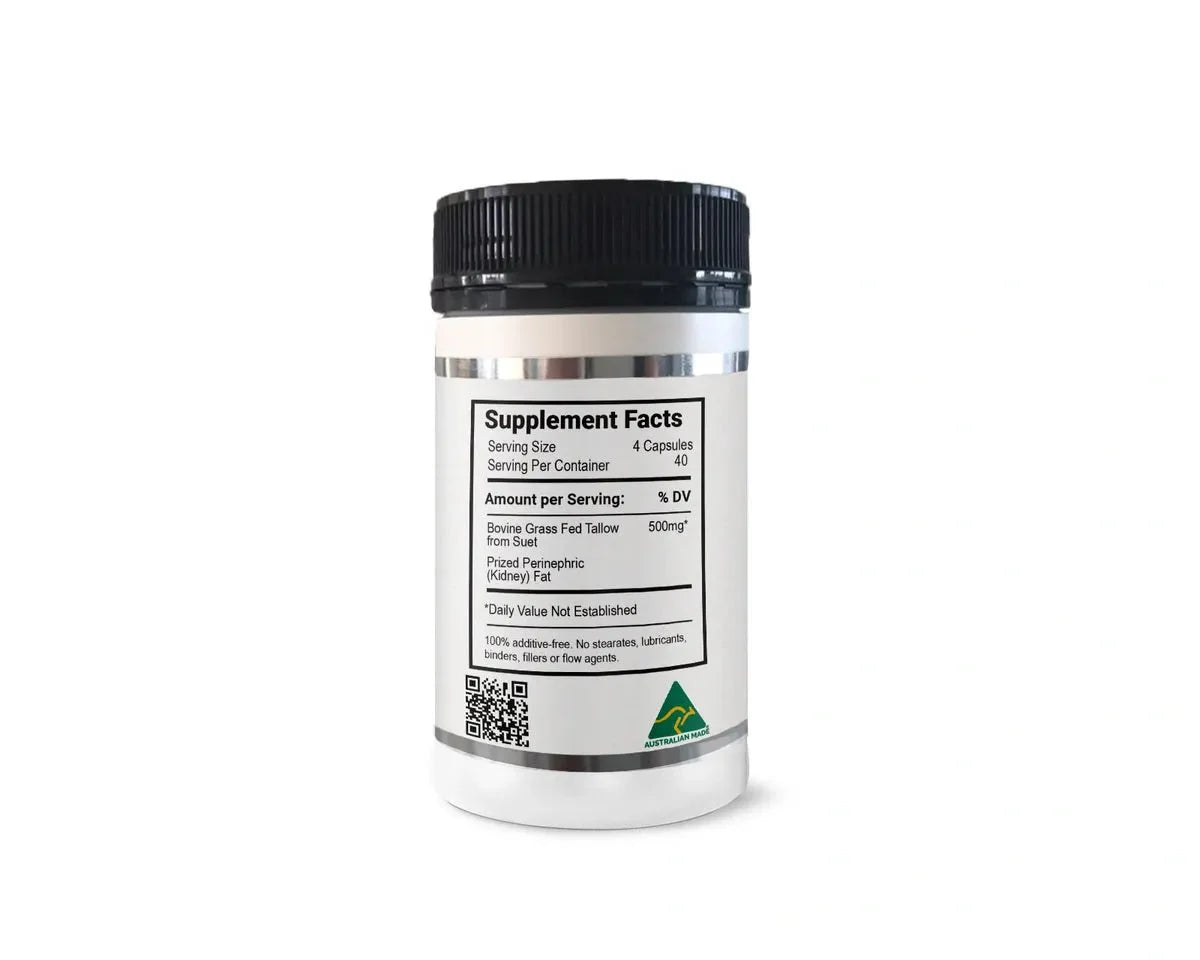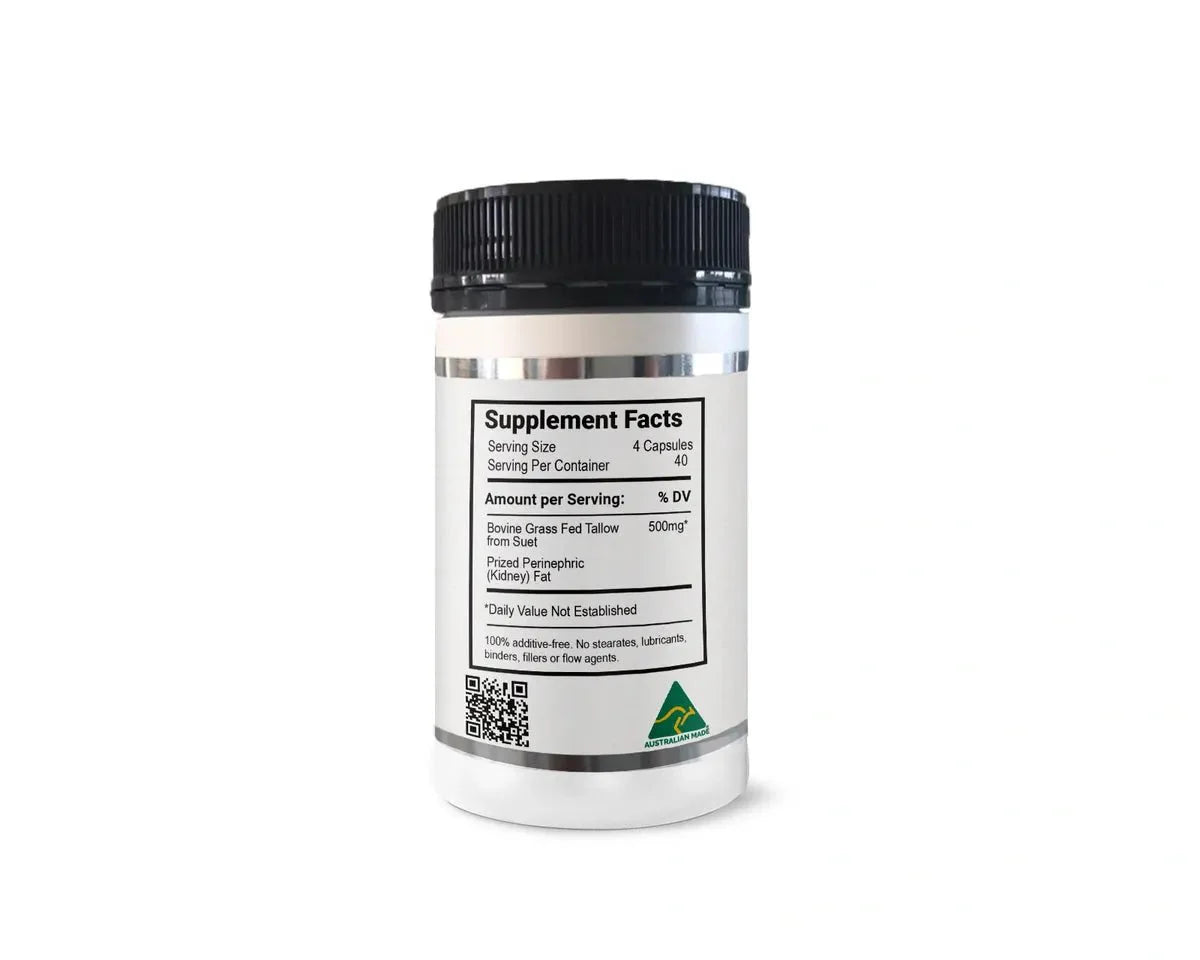Description
Description
Nxgen Grass Fed Beef Tallow Capsules from Suet — Based On The Native Wisdom of Our Early Ancestors, Tallow Provides The Same Nourishing Kidney Fat (Suet) That Our Ancestors Selectively Hunted & Consumed.
100% Grass Fed Suet has been rendered to form tallow then freeze dried, to purify and filter impurities. Grass Fed Tallow from Suet contains valuable nutrients and fat-soluble vitamins that support weight loss and healthy body composition, energy, exercise performance, mood, insulin sensitivity and mitochondrial fat-burning.
Key Nutrients in Suet:
Stearic Acid: A crucial fatty acid that turns on mitochondrial fat-burning cells to help with weight and energy.
Essential fatty acids: To support immune and cardiovascular health, as well as healthy weight management.
Vitamin K2: A critical fat-soluble vitamin that supports cardiovascular health, bone health, and anticarcinogenic activities.
Vitamin E: A powerful fat-soluble vitamin that acts like as an antioxidant to fight inflammation, as well as supports cardiovascular, immune, eye, and skin health.
More About Animal Fats
Animal fats supply the nourishing fat and the complete fat-soluble system of vitamins A, D & K (yes, E too) which the great Weston A. Price recognized as the basis of healthy primitive diets. These nutrients are the catalysts, or as Price called "activators," for the assimilation and production of proteins, enzymes, vitamins, minerals and more. Without adequate fat, we don't absorb and assimilate the fat-soluble vitamins, and without those, the body and brain cannot grow up to be tall, strong and robust.
The late, great, lipid scientist, Dr. Mary Enig of the Weston A. Price Foundation (WAPF) cites a 2006 study on fats showing that CLA (conjugated linoleic acid), which is found in high concentrations in tallow, has significant anti-cancer effects, and that supplying tallow increased those effects due its palmitic acid, another fatty acid.
Based on the ancient ancestral wisdom that "like supports like." Every animal cell (in body and brain) is made of a lipid bilayer that's approximately 50% saturated fat. We need this fatty substrate for healthy cells... we need healthy cells for healthy tissues, organs, glands... we need healthy physiology to heal and be healthy. * —
Tallow not only supplies fatty acids like CLA, oleic acid and palmitic acid but also contains vitamins A, D & K. This combination provides the matrix for absorption and assimilation of the fat soluble activators which supports and affects virtually every biological system.
Vitamins A, D, and K2 cooperate synergistically not only with each other, but also with essential minerals like magnesium and zinc, with dietary fat, and with key metabolic factors like thyroid hormone *
Vitamins A, D, and K2 interact synergistically to support energy metabolism, immune health, provide for adequate growth, support strong bones and teeth, and protect soft tissues from calcification *
Magnesium is required for the production of all proteins, including those that interact with vitamins A and D *
Grass Fed Tallow is used for the nourishing cholesterol and fat-soluble activators that form the sex steroids testosterone and DHT. NOTE: All sex hormone synthesis pathways require a pool of cholesterol substrate.
- Based on the native wisdom of our early ancestors, suet contains the same nourishing fat that our ancestors selectively hunted and consumed for robust strength.
- Suet supplies fatty acids like CLA, oleic acid and palmitic acid but also contains vitamins A, D, K & E. This combination provides the matrix for absorption and assimilation of the fat-soluble activators which supports and affects virtually every biological system.
- Suet supports inflammatory health, regulates the immune system and provides deep nourishment for growth and development (healthy bones, teeth, gums and skin).
Dr. Royal Lee, and other early nutritional pioneers, believed the degenerative processes of a specific organ / gland could be reversed by ingesting the corresponding raw materials specific to that organ / gland.[7]
You'd be hard pressed to find a better, more elegant example in nature of "like supports like" as it relates to human physiology. Fats, the right kind of fats (fats that contain around 50% saturated fatty acids, fats like tallow), nourish cell biology at the most fundamental level... at the cellular level.
100% Grass Fed Suet rendered to form tallow contains valuable nutrients and fat-soluble vitamins that support weight loss and healthy body composition, energy, exercise performance, mood, insulin sensitivity and mitochondrial fat-burning.
Composition of Foods -Fats and Oils (Reeves & Weihrauch 1979) states Beef Suet contains 50% saturated fats, 42% monounsaturated fat and 4% polyunsaturated fat. The Saturated to Polyunsaturated ratio is a high 12.5 making it one of the safest fats on the planet.
All the cells in our bodies have to communicate with each other and they do this by using proteins embedded into the cell membrane. The proteins are fixed to the cell membrane with the help of cholesterol and saturated fats! Fats therefore are essential for cellular health.
Each and every cell in the human body is made up of a lipid bilayer, known as the cell membrane, that should be stable and fluid if they contain the right substrates. That said, the lion's share of this bilayer should be made of "stable" saturated fatty acids for the cell to function properly; same holds true for our mitochondria. Unfortunately, other fat-like substances, such as trans fats, can get incorporated into cell membranes and wreak havoc, disrupting normal cell signalling. Thus, in the most basic sense, at the level of our cells and mitochondria, an incalculable number of saturated fat molecules are essential for life.
Beef Suet contains natural stearic acid (C18:0), which signals mitochondrial fusion, which makes mitochondria larger and more efficient, producing less free radical damage than when burning carbohydrates.
Polyunsaturated fats in Beef Suet provides DHA & EPA. DHA has important benefits in terms of biophysics and biology. There are numerous performative advantages to DHA, especially with regard to cognition, brain resilience and transport of the fat in blood triglycerides into cells for fat-burning (important for the heart muscle).
DHA represents about 97% of all omega-3 fatty acids in the brain,28and both EPA and DHA are essential for proper foetal development, including neuronal, retinal, and immune function. So, not only does obtaining ample EPA and DHA help stave off chronic inflammatory conditions and improve fertility, it also ensures you have the building blocks necessary for a healthy baby.
EPA and DHA are fundamental for shutting off inflammation and not letting it run wild. These effects are due to the fact that EPA and DHA serve as the precursors from which specific anti-inflammatory molecules are made.
Inflammation is known to play a role in many reproductive disorders,[25] not to mention obesity, diabetes, heart disease, and other health problems that have downstream negative effects on fertility. Infertile men have lower levels of EPA and DHA in their sperm than fertile men do,26and supplementation with EPA and DHA improves sperm quality.[17]
NXGEN Wholefoods embraces the philosophy of Ancestral Health used by traditional cultures for centuries for targeted support.
Organ meats were prized by traditional cultures more than muscle meats for vitality and healing. It’s the benefits of nose to tail eating that are missing from the modern diet that many people look for to provide targeted support "like heals like", adopting fundamental nourishment that governs our biology, health and well-being.
GRASS FED TALLOW CONTAINS...
- The Same Nourishing Fats That Our Early Ancestors Selectively Hunted For Robust Strength & Health
- The Matrix for Absorption & Assimilation of the Fat Soluble Activators (A, D, K & E); Supports Virtually Every Biological System
- Nourishing Fatty Acids: Conjugated Linoleic Acid (CLA), Arachidonic Acid (AA), Oleic Acid, Palmitic Acid, Alpha Linolenic Acid (ALA), Stearic Acid10
- Activators That Increase The Potency of CLA4
NOTE: The most common type of phospholipid contains one saturated fatty acid and one unsaturated fatty acid. The saturated fatty acids give the cell stability, while the unsaturated fatty acids provide flexibility.2This explains why without adequate saturated fat, cells become floppy, saggy... this goes for the cells you see (such as skin and gums) and cells you don't see (such as heart, brain and everything else).
GRASS FED TALLOW SUPPORTS:
- Fundamental Nourishment For Robust Strength, Health & Happiness*[2]
- Optimal Cellular Health Based On "Like Supports Like"*[2]
- Fertility & Hormone Health *[2]
- Inflammatory & Immune Health *[11,12]
- Growth & Development (healthy bones, teeth, gums and skin) *[13]
- Anticancer Effects *[14]
NOTE: A fatty acid is considered "saturated" when all available carbon bonds are occupied by hydrogen. These molecules are highly stable, which means that they do not normally go rancid, even when exposed to high heat for cooking.[2]
Dr. Paul Mason has shown that healthy saturated animal fats like that from Beef Tallow Suet when ingested in place of carbohydrates can reduce insulin and aid in reducing obesity.
SUGGESTED USE (2 CAPSULES W/ EACH MEAL)
Our Grass Fed Tallow is a whole food dietary supplement that provides 100% pure bovine tallow (from the prized suet). This supplement should be taken with food. The suggested use is 2 capsules with each meal or as directed by a healthcare professional.
BENEFITS
#1 Beef Tallow Contains Fat Soluble Vitamins
The following four are present in beef tallow:
- Vitamin A: Tallow has more Vitamin A then muscle meat and bone marrow. Vitamin A is essential for cell differentiation, skin and eye health and immune system function
- Vitamin D: Plays a role in calcium absorption. Stimulates cells differentiation. Immune system health. 77% of American’s are deficient in Vitamin D [*]
- Vitamin E: Potent antioxidant. Prevents LDL from getting oxidized. Vitamin E intake tends to be lower in Alzheimer’s patients .
- Vitamin K: Cofactor of binding to calcium, which helps prevent artery calcification. Activation of MGP which inhibits calcification. Increased Vitamin K intake is associated with lower rates of heart disease
- Many fatty acids, including palmitoleic acid, an antimicrobial fat, omega 3s and omega 6s.
.
#2 Beef Tallow May Increase Fat Burning
Paradoxically, eating more fat may increase how much fat you burn. Our body has two major hormones that regulate blood glucose and nutrient storage: Insulin and Glucagon. The two are antagonists. Insulin is a storage hormone. Glucagon is a nutrient mobilisation hormone. Ketosis occurs when Glucagon is high and Insulin is low. The high ratio between glucagon and insulin signals to your body to release nutrients from storage — i.e. body fat — and burn them for energy. Protein increases both insulin and glucagon secretion. Fat is the only macronutrient that only increases glucagon. Thus, if you want to burn more fat on the carnivore or keto diet, increasing, not decreasing your fat intake may be better. Additionally, beef tallow is high in Conjugated Linoleic Acid (CLA). Conjugated linoleic acid is a fatty acid unique to ruminants. In this meta-analysis of 18 studies, it was shown that CLA increased body fat loss.
#3 Beef Tallow is More Stable Than Other Cooking Fats
The fatty acid profile of beef tallow is 50% saturated fat, 42% monounsaturated fat and 4% polyunsaturated fat.
Saturated fatty acids are saturated with hydrogen atoms and only have single bonds. Whereas unsaturated fatty acids have multiple double bonds.
These double bonds make the fatty acids unstable.
When the AHA — i.e. the mouthpiece for Procter & Gamble — brainwashed us into fearing saturated fats, we replaced them with these unsaturated oils such as Canola oil and Sunflower oil.
This is one of the main vehicles that has driven our health off a cliff.
And this was great for the big consumer companies. The seeds were traditionally a waste product, so they were cheap.
As a result, of the fear this created, soybean oil consumption increased 1000x in the 20th century. Linoleic acid now is 8% of calories
What are the consequences of this shift? Well, you are what you eat.
Between 1959 and 2008, Linoleic Acid in human fat tissues increased by 136% . In this meta-analysis, the average concentration of linoleic acid in human fat tissue was 25%.
People are walking canola oil bottles.
Because of the double bonds, these fatty acids are very unstable. When you cook with seed oils you blast your food with cancer causing radicals.
The scarier part is that even at body temperature linoleic acid can oxidize and cause free radicals . So if your body fat is composed of linoleic acid, you’re basically a microwave causing radioactive destruction internally.
Free radicals and the toxic breakdown products of Linoleic acid like HNE are implicated in almost every disease pathology.
Vegetable oils have been linked to all of the following diseases:
- Alzheimer’s
- Cancer
- Insulin resistance
- Acne
- Heart disease
- Autism
- Dementia
- Heart disease
- Autoimmune disorders
- Leaky gut
Most importantly, it turns out that the bad cholesterol, “LDL”, is only bad when it’s damaged by unsaturated fats. Beef tallow on the other hand has very high oxidative and thermal stability. This study showed that after 40 hours of continuous heating at 180 C, only 60% of tallow had more than 25% of oxidised by-products. Whereas after just 6 hours at 180 C, sunflower oil was over 20% oxidised .
.
#4. Tallow is Affordable
Beef tallow is highly affordable and easy to make at home. Eating more fat will also cut down your protein intake and help you spend less.
.
#5. CLA May Protect against Breast Tumours and Colon Cancer
The CLA in beef tallow may protect against metastatic breast tumours. Animal studies consistently show that CLA reduces mammary tumour metastasis.
Relatively low levels of CLA are required for mice to experience these benefits. In this study, mammary tumour growth was suppressed when the researchers replaced vegetable fat with beef tallow. Additionally, studies in rats have shown that a 10% beef tallow diet suppresses colon cancer.
#6. Saturated Fat May Be Good for You
Saturated fat may have longevity increasing benefits. Some stem from the stability discussed above. But there are many more too. For instance, people in Hong Kong consume 695 grams per day of meat. That even puts Ron Swanson to shame. At that rate, you’d expect them to be practically rolling down the street and dropping like fleas from heart disease. But they actually have the world’s longest life expectancy at 84.5 years .
This study pictured below depicted similar results. Saturated fat intake is negatively correlated to heart disease in Europe. This can be explained a number of ways:
- Increased saturated fat intake tends to reduce carbohydrate consumption, which really causes heart disease
- Saturated fats tend to be higher in fat-soluble nutrients, Vitamins A, D, E and K. Increased Vitamin K intake is associated with lower rates of heart disease [*]
- Reduced vegetable oil consumption
- Half of the fat in your brain is saturated. It is indispensable to cognitive function.
- Caprylic acid, a saturated fat, strengthens the immune system [*]
- Palmitoleic acid is highly anti-viral and anti-bacterial.
- Saturated fats help build hormones [*]
- Cell membranes are 50% saturated fat.
- Saturated fats increase HDL, the “good cholesterol.”
- Scientists have now realized LDL particle size matters more than total LDL number. Diets high in saturated fat and low in carbs increase LDL size (which is a positive) [*]
- High fat diets leads to ketosis and reduces oxidative stress and inflammation.
- Because saturated fats don’t have double bonds, they’re more resistant to oxidative damage [*]
- Saturated fats have a glycemic index of 0.
Lastly, studies continue to debunk the myth that saturated fat causes heart disease. This review from 2014 looking at 76 studies, found no link at all between saturated fat and heart disease.
.
#7 Tallow May Benefit Your Skin
It’s commonly suspected that eating a fatty diet will clog your pores and make you look like a pubescent teenager. That’s not the case in my experience.
Our cell membranes are made up of fatty acids. They are ~50% saturated fat. Tallow’s make up is almost identical, which nourishes cell membranes and keep your skin moisturised.
Sebum, the oily substance that moisturises and protects the skin actually translates to tallow in latin. They are very similar in makeup with both being comprised of triglycerides.
The more fat, the better my skin. A few more explanations:
- High-fat diets can reduce inflammation
- Higher fat diets reduce insulin, which is implicated in acne
- CLA is antiviral, antimicrobial and anti-inflammatory
- Vitamin D and Vitamin E are antioxidants
.
#8. Tallow is Tasty
Beef tallow has a delicious taste, and it adds a lot of flavour to food. It’s not a coincidence either. Your body craves the nutrients and fats. That’s why it tastes so good.
#9. Tallow is “Sustainable”
Not to pile on with the sustainability buzzword, but tallow is much better for the environment than vegetable oils. The production of certain vegetable oils like palm oil, leads to widespread deforestation and a high carbon footprint. Whereas tallow from locally raised, grass fed beef can actually be carbon negative. Additionally, butchers often throw away tallow (which is absolutely crazy if you ask me…it’s like throwing gold in the dumpster). You can ask many of them for their fat trimmings (get them before they are in the dumpster) and turn them into tallow.
FDA STATEMENT*
Any statements made on this website have not been evaluated by the Therapeutic Goods Administration (TGA) and Food and Drug Administration (FDA). Product information and statements made are not intended to diagnose, prevent, treat or cure any disease.
Sources and References
- https://books.google.com/books?id=jxsR83VZc84C
- https://books.google.com/books?id=WB85DwAAQBAJ&pg
- www.westonaprice.org/health-topics/traditional-diets/guts-and-grease-the-diet-of-native-americans/
- https://www.manataka.org/page2200.html
- www.westonaprice.org/health-topics/know-your-fats/some-recent-studies-on-fats/
- www.westonaprice.org/health-topics/know-your-fats/the-skinny-on-fats/
- Fishman, Stanley A. "The Benefits of Organ Meats." Tender Grassfed Meat. N.p., 09 Dec. 2014. Web. 17 June 2017.
- https://en.wikipedia.org/wiki/Pemmican
- "Spleen, 500mg, 180 Capsules." Dr. Ron's Ultra-Pure. N.p., n.d. Web. 17 June 2017.
- www.westonaprice.org/health-topics/know-your-fats/fatty-acid-analysis-of-grass-fed-and-grain-fed-beef-tallow/
- https://www.ncbi.nlm.nih.gov/pubmed/15674307
- https://www.ncbi.nlm.nih.gov/pubmed/15159257
- http://gutenberg.net.au/ebooks02/0200251h.html
- https://academic.oup.com/jn/article/136/1/88/4664179
- http://www.whitewolfpack.com/2013/08/elders-talk-about-significance-of-long.html
16. https://www.westonaprice.org/health-topics/know-your-fats/some-recent-studies-on-fats/
17. Hosseini, B. et al. The Effect of Omega-3 Fatty Acids, EPA, and/or DHA on Male Infertility: A Systematic Review and Meta-analysis. J. Diet. Suppl. 1–12 (2018).
18. Greenberg, J. A., Bell, S. J. & Van Ausdal, W. Omega-3 Fatty Acid supplementation during pregnancy. Rev. Obstet. Gynecol. 1, 162–169 (2008).
19. Swanson, D., Block, R. & Mousa, S. A. Omega-3 fatty acids EPA and DHA: health benefits throughout life. Adv. Nutr. 3, 1–7 (2012).
Payment & Security
Payment methods
Your payment information is processed securely. We do not store credit card details nor have access to your credit card information.

